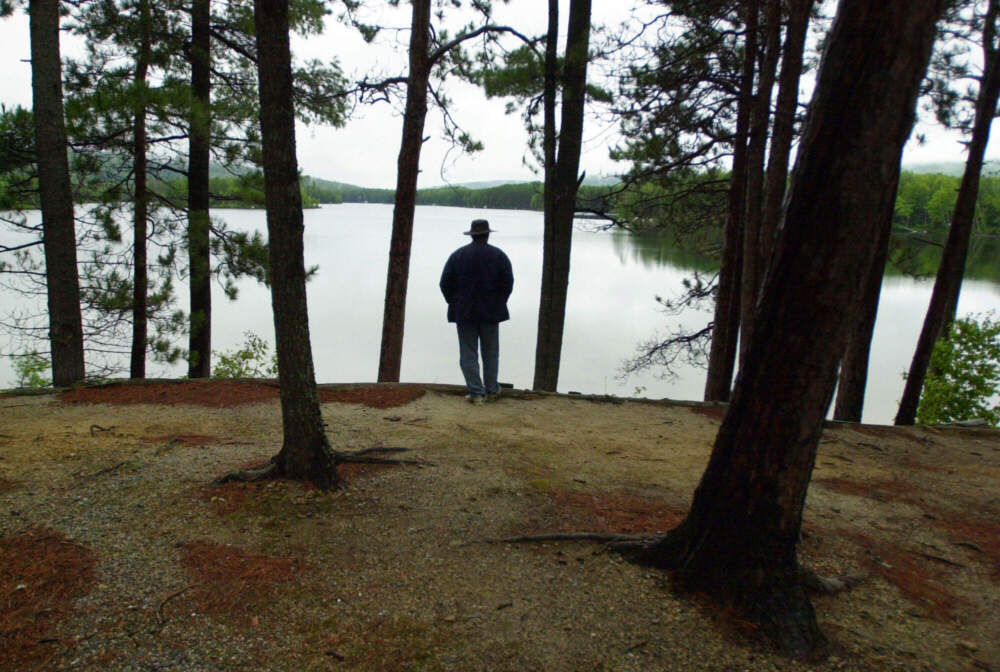How Loneliness Can Work in Your Favor
Loneliness is an emotional epidemic; it feels like you can’t win the battle of feeling isolated without forced friendships and social media binges. Lucky for you, you pushed past those unrealistic solutions. You are seeking help on your own, which happens to be the first step to working through your situation. And remember, loneliness can work in your favor, as I’ll be sharing with you here.
Loneliness is often viewed as a negative, but for writers and entrepreneurs it can actually become an asset when framed differently.
I can remember a song that was popular when I was a child. It was from Elvis Presley and titled Are You Lonesome Tonight? I never could understand why it made people cry. Perhaps at an early age I was already enjoying my moments of solitude.
Loneliness comes in all kinds of different flavors. You can be lonely when you’re with people, when you’re alone on your couch, or after a life-changing event, like a break-up or the loss of a loved one. With all of that in mind, you should know that the feeling of isolation is pretty universal. It’s not fun, and it’s easy to feel trapped in a vicious cycle of loneliness, but it is, nonetheless, a common feeling.
Before we really dive into everything, here’s an important disclaimer: If you’re ever feeling so lonely that you feel significantly isolated, or maybe even depressed, you should reach out for professional medical help. That’s what the professionals are there for! There is nothing to be ashamed about when asking for help; in fact, it’s an act of bravery and a hallmark of self-respect. Nothing shouts, “I respect myself” more than listening to what you need and being kind to your mind, body, and soul.
Here, you’ll discover a whole new interpretation of loneliness. You’ll learn how to spot it, how to define it within the context of yourself, and ultimately, how to get yourself back to a better headspace. Let’s start by understanding what it means to feel lonely and how that affects your mind and your body. Once we have a good understanding of that, you’ll learn the surprising benefits of alone time. It’s an experience and a feeling that makes you human, so it’s important to treat it that way instead of with resistance and negativity. Finally, we’ll address the question that’s bugging us all: How do I deal with loneliness? This section will cover how to pave a path of overcoming your situation and using it as a learning experience for the future.
Now is the perfect time to stop the self-deprecation, curl up in a comfy spot, and read on to learn how to work through your circumstances. It’s a journey that should be enjoyed every step of the way, so let’s embark on it with hope and high spirits!
How Loneliness Can Work in Your Favor as a Writer or Entrepreneur
-
Space for Creativity
Loneliness removes distractions. It gives you mental and emotional “room” to think, reflect, and create. Writers can sink deeper into their characters, stories, and ideas. Entrepreneurs can spot opportunities others miss because they’re not drowned in constant noise. -
Sharper Self-Awareness
When you’re alone, you’re forced to confront your own thoughts, patterns, and fears. This awareness can make you more authentic in your writing, and more decisive and intentional in your business. -
Fuel for Connection
The experience of loneliness helps you understand the universal human need for connection. Writers can translate that into powerful stories that resonate. Entrepreneurs can use that insight to create products, services, and communities that truly connect with people. -
Motivation to Build
Feeling lonely can push you to take action: to build your audience, network, or client base. It’s the fuel that reminds you success isn’t just about money—it’s also about relationships and impact. -
Resilience Training
Entrepreneurs and writers often spend long stretches without external validation. Learning to handle loneliness strengthens your resilience and helps you keep going when the adoration or sales aren’t immediate. -
Creative Rebellion
Many breakthroughs happen when people step away from the crowd. Loneliness can become a badge of freedom—proof you’re not afraid to take the less-traveled road and think differently. -
Deep Work and Productivity
Time alone—without constant meetings, notifications, or chatter—creates the conditions for achieving the “deep work” state. Writers can draft chapters, entrepreneurs can design offers or strategies, all without interruption.
The Effects of Loneliness
Everyone at one point or another experience loneliness, and like all feelings, its causes are unnumbered. You could spiral into a vortex of loneliness from anything: stress, loss of a loved one, a tragic event, or feeling isolated from friends and family.
Feeling alone doesn’t equate to loneliness. It’s important to understand that distinction. You should always separate those two states of mind because alone time is a good thing. In fact, it’s a great thing.
Ever heard of Henry David Thoreau? A famous quote by him (although there are many) is this: “The man who goes out alone can start today, but he who travels with another must wait until that other is ready.” Believe it or not, Thoreau embarked on his own self-journey when he committed to a solitary life in the woods. He came up with profound thoughts and wrote literary works that are still praised 150 years after his death.
He, like many, enjoyed alone time. You can too. Don’t let the thought of being alone keep you from enjoying your life and learning about yourself while you’re at it.
Now that we have a grasp on alone time, let’s distinguish it from loneliness.
Loneliness is connoted with feelings of sadness and negativity. It isn’t usually associated with a triumphant feeling of “I can conquer the world!” or “I know myself so much better now.” Instead, the feeling of being lonely often equates to feeling empty.
With that being said, it’s in your control whether or not you allow that feeling to consume you. Like most people, you’ll naturally experience it from time to time, but you can minimize the negative effects it will have on your life.
First, let’s understand what some of those effects are. This way, you’ll have a grasp of what loneliness can do to you, which will feed your motivation to beat it. Then, you can nip those negative feelings in the bud as soon as you get an inkling that they’re beginning to creep in.
Physical Effects
Impact on Your Eating Habits
It turns out that weight loss and weight gain are two ways that loneliness could impact your body. Does loneliness correlate to an instant change in your weight? No. But according to a 2012 research study, loneliness does have the potential to relate to a change in eating patterns, or even an eating disorder.
It seems counterintuitive that a feeling could result in two opposing effects: losing weight or gaining weight. But it’s all because it depends on your body. Everyone’s body is different, so the way you internalize is unique to you. If your feelings manifest in stress, you may be more likely to experience weight loss as a result. Weight loss is sometimes associated with an increase in stress. The more you stress, the less you eat, and the more your body burns calories because it’s so consumed with being stressed out all the time.
On the other hand, loneliness sometimes results in weight gain when eating becomes a vice and a binge-driven hobby. If you’re feeling sad or isolated, a pint of ice cream may feel like an instant remedy. This becomes a self-propelling cycle because you’ll convince yourself that eating makes you feel better and relieves the painful feelings you are experiencing.
Here’s the upshot: You should be cognizant of what’s going on in your body, specifically when it comes to your diet and workout habits. If you’re already feeling blue, don’t let additional things bring you down because it will be more difficult to recover.
Increased Inflammation
What do you think of when you hear the word “inflammation?” Irritation, redness, and breakouts? Sure, those are some telltale symptoms of experiencing inflammation, but the science behind inflammation is simple: It’s your body’s way of defending itself. With inflammation, chemicals are being released into affected areas to ward off infection. As a result of all of those chemicals, you may experience redness, warmth, and irritation.
You may be wondering how that relates to loneliness. Like many psychological experiences, occurrences in the mind are often internalized in the body. Loneliness and inflammation are perfect examples of this.
This goes back to Darwinism—it’s all about survival. In primordial times, our bodies were wired to think of loneliness as a threat. It meant we were siloed off on our own, away from others who were in the survival pack. This threat triggered inflammation as a defense mechanism. Because of that, our bodies became wired to inflame when we felt lonely, and that reaction still prevails in today’s world.
Risk of Developing Heart Disease
A 2018 study shows that social isolation is associated with heart disease and can be a predictor of premature death. We’ve all heard the phrase, “Dying from a broken heart,” and loneliness is no exception to this trope. One key finding from this study was that in most cases, loneliness negatively affects mental health.
Loneliness has a snowball effect on most people. It begins with compromised mental health, which spirals into overall sadness and unhealthy lifestyles, and then that becomes a vicious cycle of self-pity. The tip of the iceberg is when it affects your heart, putting you in jeopardy of heart disease or even a shortened life expectancy.
The thing to watch out for with some of these physical effects (especially something like an increased risk of heart disease) is how silently they creep up on you.
Stress, Stress, and More Stress
A common thread between loneliness and physical effects is stress. Stress is the root of most of these physical afflictions, and it’s easily swayed by a person’s socialization patterns. A study by Psychology Today tells us that stress is more common in those who limit their social interaction. In other words, the less you interact with people, the more you may feel stressed in other aspects of your life.
Psychological Effects
Mind Over Matter
When you begin to experience a new or foreign emotion, your brain delves into every facet of the feeling. It is rarely a feeling that comes and passes. Instead, it is usually a full-blown emotion that every ounce of your being seeks to experience. That’s part of being a human—categorizing different feelings and understanding our own unique response to them.
The same goes for loneliness. It’s all in your head. And unfortunately for those who are feeling isolated, the feeling becomes a never-ending series of varying levels of loneliness. In fact, the average person experiences 48 days of loneliness per year.
It’s critical that you understand that it’s the thoughts you have about loneliness that perpetuate the cycle. That is good news because it means it’s under your control. It’s something that you can easily manage, and while it takes time to get to a place where you are comfortable in your own skin (alone or not alone), it is feasible.
Depression
Depression isn’t a direct result of loneliness, but it’s a psychological disorder that sometimes comes from being lonely. Depression is a mental illness that hails from many factors, so if you’re experiencing loneliness, you should be on the lookout for signs of depression.
Once you are in the cycle of loneliness, getting out of it can be a bear. In order to avoid toggling between extreme highs and lows, you’ll want to find a middle ground that keeps you feeling balanced. That typically means confronting your feeling of isolation and coming up with a game plan on how to embrace it as alone time rather than involuntary loneliness.
Alcoholism
You should never get to a point where pouring a few extra glasses is the solution to your problems. It feels like a simple solution, but it is more destructive than it is helpful. Now, it’s one thing to treat yourself to a glass of wine or maybe your favorite beer, but you shouldn’t be drinking to make yourself feel better.
More than 27 million individuals suffer from alcoholism, and because of alcohol’s addictive properties, it’s something that everyone should be cautious about. The stakes are even higher if you’re already in a shaky emotional state, so be in tune with yourself and know when enough is enough.
Social Isolation
Remember that snowball effect we talked about? The same goes for social isolation. Once you feel lonely and your self-esteem levels are compromised, you may feel less inclined to meet up with friends or put yourself out there.
That doesn’t mean you should throw yourself into any and every social situation that exists. In fact, at a time like this, you should take time to discover who lifts you up and empowers you as a friend and supporter. Be picky about who you spend time with!
The times when you feel most alone afford you the ability to reset and change your life course. Examine those who bring you fulfillment and joy; on the flip side, think about how you contribute to your friend and family circles. It’s this fulfillment and a sense of purpose that will nurse your void of social interaction back to a healthy spot.
Behavior and Disposition
Loneliness overlaps with all types of feelings and states of mind. You may notice a change in your work ethic, or maybe your creativity levels drop. Some studies even show that people who feel lonely tend to under-perform on assessments and exams.
It’s unlikely that you will notice all of these effects at once, but if you’re beginning to see some signs of them in your daily life, it’s a good idea to be proactive and try to understand how to defeat the feeling of being lonely and isolated and find ways to combat it.
Would you be surprised to know that despite these not-so-desirable effects of loneliness, there are also some benefits that come from being alone? Keep in mind, these benefits don’t erase the other negative effects; those are still potential effects of loneliness that could be experienced if you don’t work towards reaching a happier state of mind. With that said, it is important to know that there are pros and cons to every story so that you can focus on the good and work towards eliminating the not-so-good.
The Surprising Benefits of Being Alone
We’re not going to dismiss your negative feelings with a big red bow and a card labeled “Benefits.” Even if there are a number of positives that come from alone time, we implore you to continuously work towards achieving greater happiness.
With that being said, let’s revisit what we talked about earlier. Remember the quote from Henry David Thoreau I shared above? Loneliness does not mean being alone. So rather than being hard on yourself for having extra alone time on your hands, you can use it to explore who you are and who you want to be. Believe it or not, the benefits begin with making this distinction. When you know where you stand on the loneliness-to-alone-time spectrum, you’re more able to avoid any unnecessary emotional ravels that come along with self-exploration.
Loneliness vs. Being Alone
Let’s look at a few different examples of loneliness vs. being alone to ensure you understand which category your feelings belong to.
Lonely: After getting home from a work event, you turn on the TV and pour yourself a glass of bourbon. You didn’t enjoy the event, and you feel like no one likes you. You continue drinking throughout the night so that you’re able to forget the sadness you feel.
Being alone: You get home from a work event and start reading a new book. You enjoyed the party, but lately you’ve just been feeling like you need more time to yourself. Sometimes the house feels quiet and empty, but you’re really learning more about yourself, and you feel like you’ve needed this time after a long day.
Connecting with others when the time and setting are right works extremely well for me.
I’m bestselling USA Today and Wall Street Journal author Connie Ragen Green. My goal is to help at least a thousand people to reach six-figures and beyond with an online business for time freedom and passive income and to simplify your life. Come along with me, if you will and let us discover how we may further connect to achieve all of your dreams and goals. This is also why I want you to think about taking full responsibility to jump start your goals, and to think about how loneliness can work in your favor. Perhaps my “Monthly Mentoring Program” is right for you.



Leave a Reply